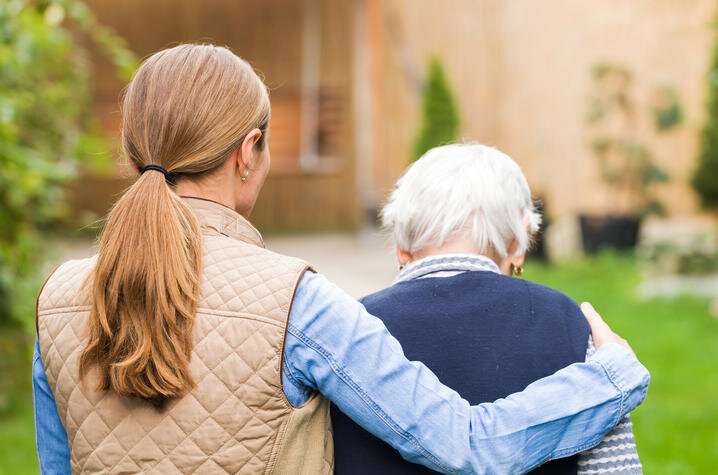Caregiving during the COVID-19 pandemic

In Kentucky, there are more than 272,000 people caring for someone with Alzheimer’s disease. If you are one of those people, the person you are caring for is considered high risk for the novel coronavirus (COVID-19). Most persons living with Alzheimer’s are over the age of 65 (one risk factor), and most persons over 65 have at least one chronic illness (another risk factor). Here, experts with UK’s Sanders-Brown Center on Aging share information on best practices during this outbreak.
Guidance for Caregiving
- Hand-washing and sanitizing—If you leave the home, always wash your hands when you return and frequently during the course of the day.
- In your home—Clean high-use surfaces in your home using four teaspoons bleach to four cups of water. Clean doorknobs, sink handles and refrigerator doors.
- Manage underlying chronic health conditions –Ask medical providers to call in refill prescription orders and see if the pharmacy can deliver or has a drive-through pickup window. Do this for the medications that both you and your care-recipient take.
- Monitoring for COVID-19—Watch yourself and your person for symptoms (fever, cough, sore throat). Call your doctor if you have any symptoms. You need to have a plan if you would not be able to provide direct care to your loved one.
- Help from outside the home—If someone is coming into your home to help provide care, they should adhere to hand-washing rules and follow good self-care procedures. Ensure they are monitoring him/herself for symptoms of COVID-19.
- Social distancing—Remove yourself and your person from close contact with groups of people. This is admittedly very difficult, so here are some suggestions:
-
- If you are working outside the home, see if it is possible to work from home through telecommuting means (phone and video call contact, etc.)
- If your place of worship offers streamed services, use that as your time of worship. Call a member of your religious organization and worship together over the phone by reading your self-identifying scripture.
- If you have to take your person shopping, call ahead to see if they have specific times only older adults can shop. Call friends, family or neighbors to see if they are going to the store and can pick up items you might need.
- If you are ordering takeout from a restaurant, see if they can deliver curbside and pay over the phone.
- Here is a hard one: limit family visits, including visits with any grandchildren. Connect via phone, video calls (such as Apple’s FaceTime) or visit outside while keeping at least six feet apart.
- Outings that present minimal risks: going to a park and taking walks or a drive.
Home Engagement Opportunities
Sticking to a routine can help keep things feel normal. Keep the curtains open and lights on during the day. Try new activities within the home. Listen to music, look through or organize photographs, fold washcloths or put together socks, talk about historical events, play cards, garden or craft. Here are some tips for at-home activities:
- Be flexible and patient.
- Avoid correcting the person.
- Help the person remain as independent as possible.
- Offer opportunities to make choices (two choices maximum).
- Simplify instructions.
- Establish a familiar routine.
- Provide encouragement and support.
- Help get your person started in the activity if they don’t start themselves.
Behaviors
Source: Read Full Article


